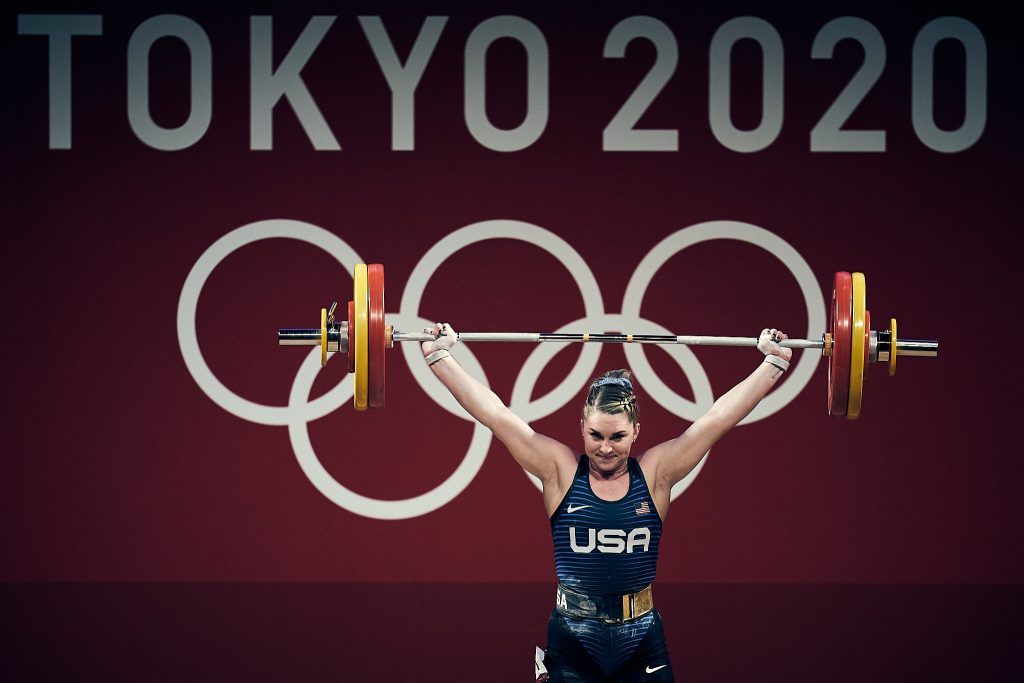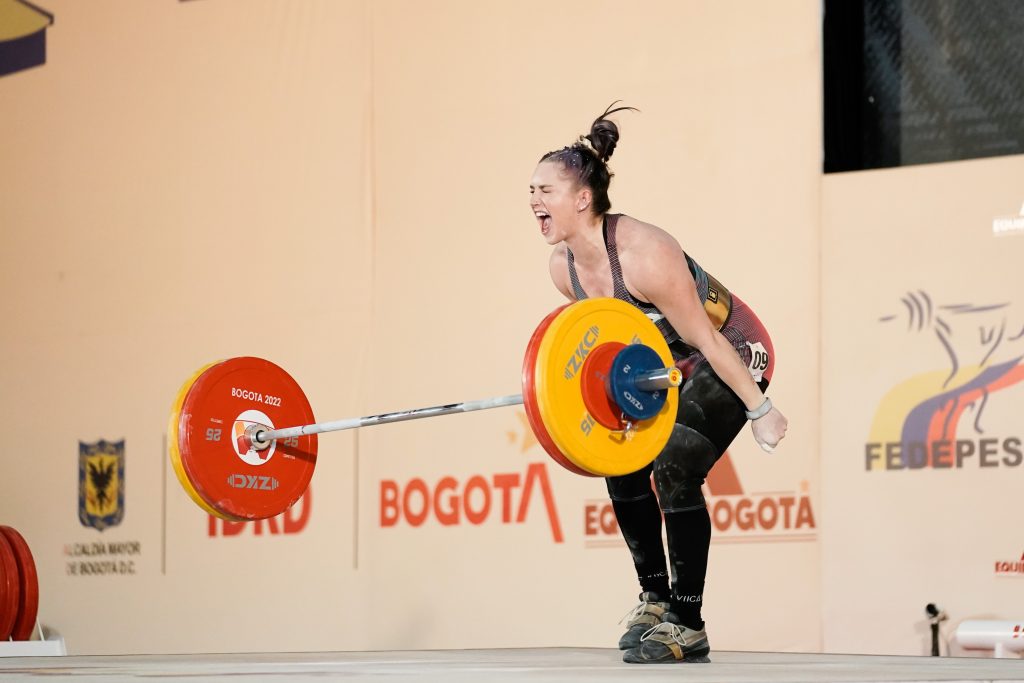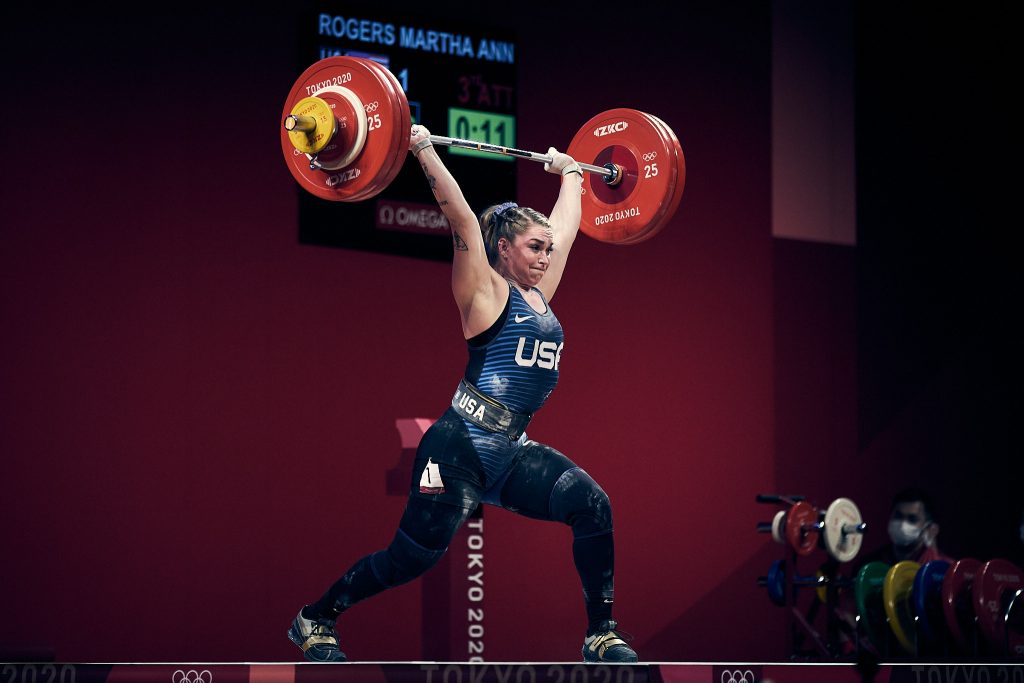Mattie Rogers (USA): “Nothing replaces competing at the Olympics!”
“Always a bridesmaid, never a bride”. The expression is self-explanatory and is used by US lifter Mattie Rogers to describe her past performances at the IWF World Championships: 13 medals, including nine silver and four bronze. The so-awaited gold may be reserved for 2023, at the global showcase in Riyadh (KSA), in September. “I don’t know… I have always been on silver, I would love a gold, but it’s going to be my first time in this super competitive 81kg category… It’s going to be hard!” she admits, laughing. Last December, in Bogota (COL), she was second (overall: 247kg) in the 76kg category, after three previous silver linings in 2021 (243kg), 2019 (240kg), and 2017 (235kg).
Born on August 23, 1995, Rogers leaves this week for Bariloche, Argentina, where she will defend her 2022 Pan-American title in the 76kg. “I would like to say that the goal is to win, but I’m pretty much number-focused right now. This is an Olympic qualifying event, so if I have to take a lift just to secure a higher total than what I did at the World Championships that will be the goal. Make whatever is on the bar and be happy with that”, she explains. At the international level, the results achieved last year at the continental championships are her personal bests: 252kg overall (snatch: 111kg, clean & jerk: 141kg). But in 2021, she had done better on national soil: 255kg (112+143).

Initially a competitive gymnast for 12 years, the young Mattie then wanted to “try other sports”. She found CrossFit and thanks to that, her first weightlifting coach. In between, she was a cheerleader for four/five years. “It was a kind of transition between gymnastics and weightlifting. My cheerleading coach used to put us on some conditioning workouts and was doing also a bit of CrossFit. He told me: ‘you should come to the gym with me’. And the gym owner was an Olympic weightlifting coach. Once I got on CrossFit – at my own rhythm – he told me: ‘I know you could be a good weightlifter!’ It was just a question of time”, the US star recalls. She competes at her first US Junior Nationals and the doubt was gone. “It was the first time I said ‘maybe, just maybe, I can really be good at this’. I have a good raw strength, a strong athletic background, but as far as being really strong, I still didn’t have that. So, it was not something I had planned; it was rather something I had to put a lot of effort into it even before I could realise this was something I could do well”.

Games’ rollercoaster
2016 is the year when the first international successes emerge: silver at the Pan-Ams (69kg category) and gold at the FISU University Championships. By that time, the Olympics take place in Rio de Janeiro – Mattie Rogers travels to Brazil as an alternate lifter. She doesn’t compete; instead, she supports her teammates from the stands. “I was happy to be there, but it wasn’t a full Olympic experience…” Fast forward five years later, and we find her at the Tokyo Games (largely impacted by the Covid pandemic), this time as a member of the competing US team. “Going to Japan, I finally said: ‘I’ll have the full experience there’. And it wasn’t still that… We were there just for four days, it was very quick, hard to see any other sport. I was of course very happy to be at the Olympics, I wouldn’t trade it for anything else in the world, but it was a kind of a bummer. It wasn’t once again the full Olympic experience”, Rogers admits.
Performance-wise, the Florida-based lifter, doesn’t hesitate to label the experience as both her best and worst career memory. “Nothing replaces competing at the Olympics! That’s every athlete’s ultimate goal. But it was also the worst competition of my life! It was terrible for me. It’s hard to pinpoint what was wrong – it was just not my day… I was also dealing with some mental issues at the time and that played a big part in it. I had a panic attack going into clean and jerks, and it was really difficult to recover and hold it together. It was both an embarrassing and scary moment,” she painfully considers. In the Japanese capital, she finished sixth in the 87kg, with a total of 246kg (108+138).
After Rio 2016 and Tokyo 2020ne, Rogers is cautious concerning the expectations for Paris 2024: “I just want to get there, I don’t care how it will look like, if I can have fans or not there, I don’t care… Just being there and I’ll be ecstatic!” Looking still ahead, she proceeds: “I really hope weightlifting can be in Los Angeles, in 2028. Not just for me, as it could be the end point of my career, but for the younger generation. Athletes who are in their late teenage years dream to go to the Olympics. Not knowing if they will get a chance to be there, it’s upsetting. So I hope we can get it together, come back, and be fully included in the Olympic programme”.

“We do a great job together”
Surrounded by animals in a big farm, the US champion is training most of the time alone. “It’s a bit challenging with my coach [Aimee Anaya Everett] as she lives in Oregon and me in Florida. So, there is also a very good job in communicating as I train completely by myself. But I couldn’t ask for a better coach – I wish we could be together more often, but we do a great job together!” While on the screen (this interview was a video online call), a cat walks behind Rogers. “It’s my training partner. I have my chickens outside, doing all kinds of noises when the cat is approaching… We have quite a farm… Four cats inside and as many as we can find outside. Yeah, I go anywhere, I see a cat, and I want to bring it home!”
Coming from a family with “good athletic genes” (her parents were competing at high-school/college level), the 27-year-old lifter has developed in the last couple of years a clothing line, aimed at serving the lifters. “There is a lot of fitness stuff out there, but they don’t really fit well on weightlifters… We are just larger people. So that was the main driving force behind the project. I wanted to make it size-inclusive, gender-inclusive, just as inclusive it could be, so that it could serve everyone in the sport”. Still a small five-people project (taking care of the design, production, and promotion), “the business is steadily growing”.
Graduated in December 2020 (Sports & Exercise Science), Rogers necessarily thinks of a future beyond competitive weightlifting. “Coaching will always be a part of my plans. I already do it now – I have my own athletes and programmes. That’s something I love and it will always be a kind of part-time job. For weightlifting, and for the time being, it’s not something from which you can do a fruitful career. There’s no money in coaching yet, and that’s what it is. So, I’ll always do that because I love it, and then whatever I need outside of that to survive. We will see what happens when the time comes”.
Honesty and authenticity
Also very active on social media (with over 658k followers on Instagram at the time of this interview), the world silver medallist admits being a role model for the younger generation. “I try to be very honest and genuine. If I feel I am not being authentic, honest, or genuine, I hate that. I portray myself the same way I would do with my close friends and family. I hope they like it. I feel grateful for having such a kind and encouraging audience. I feel that my audience also looks at me in search of motivation and inspiration, but perhaps also on technique tips… They are in general very supportive”.
Considering herself a “lucky athlete on the injury front”, Mattie Rogers reflects on her passion for the sport: “I love it because I’ve always loved individual sports. It’s only you, 100% you. It can be great, or it can be terrible. But I love that and that’s how I grew up. I also love how technical it is. You can be the strongest person in the world and be terrible at Olympic weightlifting. You need both the technical aspect and the strength – one alone, is not enough. So, there is always something you can still work on”. On the competition’s environment, she is clear: “They are always scary, terrifying, but exciting! It’s always an adventure!”
Finally, on the place of women in the sport, the US lifter believes weightlifting is now gender-balanced: “It has become more popular, especially over the last 8/10 years. There is a ton of women realising that being strong is indeed quite cool, and fun! We are definitively heading in the right direction. Every year, I feel the women’s weightlifting classes are getting more and more packed. That’s a proof of progress,” she concludes.
By Pedro Adrega, IWF Communications
Photos by Isaac Morillas










